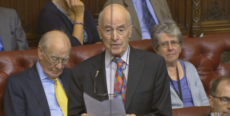
During oral questions in the House of Lords, peers from a range of parties have challenged the Government’s response to last year’s High Court ruling on the place of non-religious worldviews in religious education (RE).
Last year, the High Court ruled against the Department for Education (DfE) and in favour of three humanist parents and their children who challenged the Government’s relegation of non-religious worldviews in the new subject content for GCSE Religious Studies. The Court stated that religions and non-religious worldviews such as Humanism must be afforded equal respect in the RE curriculum. Despite this, the DfE stated that ‘the judgment should not be taken as having any broader impact on any religious education curriculum’, and issued guidance in December 2015 to that effect. At the request of teachers and others who were uncertain as to the implications of the judgment, the BHA therefore circulated guidance for schools and teachers, produced by legal experts. The DfE have since labelled that guidance as ‘inaccurate’, without explanation, and peers were therefore moving to clarify the position.
Opening the questioning, Liberal Democrat peer and co-chair of the All Party Parliamentary Humanist Group (APPHG) Lord Taverne asked that whilst ‘it is of course right that children should be taught about the religions of the world’, was it ‘really the Government’s view that children should not encouraged to think critically and make up their own mind, and should not be made aware of the views of a very large number in this country, and growing, who do not subscribe to any religion?’. Failing to answer, Lord Nash simply repeated the Government’s line that the case involved only a ‘very narrow, technical point’. And pressed by Labour peer Lord Harrison, also an APPHG member, on the fact that the government’s own guidance seemed to contradict the judgment, the Schools Minister simply stated that ‘We’ve issued clear guidance in December on this matter and we don’t recognise that point’.
Introducing himself as a ‘lapsed atheist’, the Bishop of Chelmsford said that he ‘welcome[d] the place of non-religious worldviews in RE’, and that such inclusion was ‘very, very important’ in strengthening the subject, an assertion Lord Nash appeared to agree with. This prompted Liberal Democrat Education Spokesperson Lord Storey to ask: ‘Why, if the Government does actually believe that non-religious beliefs have a full and important place in RE, they have moved to encourage schools and those who set syllabuses to ignore a legal judgment which sets out exactly that position?’ Lord Nash simply reiterated that in the Government’s view the ruling was a ‘narrow’ one, an answer he also gave to BHA patron Lord Hughes of Woodside who sought an explanation for the Government’s response to the judgment.
Disappointingly, when asked about the importance of children learning about religions at school, Lord Nash stated that ‘It helps you to respect someone if you understand more about them’, a sentiment he did not appear to extend to the teaching of non-religious worldviews as well.
BHA Education Campaigner Jay Harman said: ‘Once again, the Government have failed to be clear and honest about the implications of last year’s High Court ruling, which stated very plainly that religions and non-religious worldviews must be placed on an equal footing in RE. The DfE is displaying a total lack of respect for the rule of law, for the views of non-religious people all over the country, and for the schools and teachers who they continue to put at risk of unlawful action as a result of their misleading guidance. We’re glad this has been challenged in Parliament, and we will go on pressing the Government to accept the law as clarified by the High Court last year.’
Notes
For further comment or information please contact Jay Harman on jay@humanists.uk or 020 7324 3078.
Read the full debate here: https://hansard.parliament.uk/lords/2016-06-30/debates/16063032000568/SchoolsReligiousEducation
Read the BHA’s letter to Nicky Morgan from May 2015 responding to unfair criticism of its work by the Department for Education: https://humanists.uk/wp-content/uploads/2016-05-27-FINAL-Letter-to-Nicky-Morgan-guidance-on-RS-GCSE.pdf
Read the guidance circulated by the BHA last month: https://humanists.uk/wp-content/uploads/2016-04-28-FINAL-High-Court-ruling-on-Religious-Education-legal-guidance.pdf
Read the DfE’s response to the legal guidance, published as part of a joint statement from NASACRE and AREIAC: http://www.nasacre.org.uk/file/nasacre/1-225-nasacreareiacresponsetodrsatvinderjussadviceupdated0716.pdf
Read the Government’s own guidance from December 2015: https://www.gov.uk/government/uploads/system/uploads/attachment_data/file/488477/RS_guidance.pdf
Read the full High Court judgement: https://humanists.uk/wp-content/uploads/R-Fox-v-SSfE-2015-EWHC-3404-Admin-251115.pdf
Read the BHA previous news item ‘BHA responds to new Government guidance on Religious Studies GCSE’: https://humanists.uk/2015/12/29/44457/
Read the BHA’s news item ‘Judge rules Government broke the law in excluding Humanism from school curriculum’: https://humanists.uk/2015/11/25/judge-rules-government-broke-the-law-in-excluding-humanism-from-school-curriculum/
Read the BHA’s briefing on why Humanism is now normally included in Religious Education syllabuses: http://humanismforschools.org.uk/guidance/why-humanism-is-included-in-religious-education-re/
Read more about the BHA’s work on RE: https://humanists.uk/campaigns/schools-and-education/school-curriculum/religious-education/
The British Humanist Association is the national charity working on behalf of non-religious people who seek to live ethical and fulfilling lives on the basis of reason and humanity. It promotes a secular state and equal treatment in law and policy of everyone, regardless of religion or belief.
